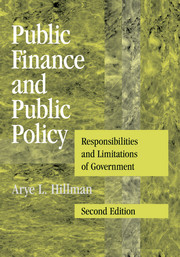Book contents
- Frontmatter
- Contents
- Preface to the Second Edition
- 1 MARKETS AND GOVERNMENTS
- 2 INSTITUTIONS AND GOVERNANCE
- 3 PUBLIC GOODS
- 4 PUBLIC FINANCE FOR PUBLIC GOODS
- 5 MARKET CORRECTIONS
- 6 VOTING
- 7 SOCIAL JUSTICE
- 8 ENTITLEMENTS
- 9 CHOICE OF TAXATION
- 10 THE NEED FOR GOVERNMENT
- TOPICS FOR DISCUSSION
- Author Index
- Subject Index
- References
10 - THE NEED FOR GOVERNMENT
- Frontmatter
- Contents
- Preface to the Second Edition
- 1 MARKETS AND GOVERNMENTS
- 2 INSTITUTIONS AND GOVERNANCE
- 3 PUBLIC GOODS
- 4 PUBLIC FINANCE FOR PUBLIC GOODS
- 5 MARKET CORRECTIONS
- 6 VOTING
- 7 SOCIAL JUSTICE
- 8 ENTITLEMENTS
- 9 CHOICE OF TAXATION
- 10 THE NEED FOR GOVERNMENT
- TOPICS FOR DISCUSSION
- Author Index
- Subject Index
- References
Summary
This final chapter is about the need for government. In section 1, we consider the growth of government from the time of Adam Smith and ask whether the growth of government has been consistently socially beneficial. In section 2, we investigate the role in a society of trust, also known as social capital. We conclude in section 3 with an overview of why economists' views on the need for government can differ.
Growth of Government and the Need for Government
A measure of the size of government is by fiscal criteria of taxation and public spending. Measurement of the size of government includes, however, also regulation by governments of economic activity and ownership of firms by governments. Hence, the scope of taxation and public spending, or public finance, is only a partial measure of the size of government. We include public policy as an indication of involvement of government when we consider resolution of externality problems and the seeking of paternalistic objectives through regulation and when we consider, for example, the role of international trade policy in social insurance and income redistribution.
How and why did government grow?
The questions of how and why government grew take us to economic history. A course in economic history provides a comprehensive background for answering our questions. We shall make do with a more limited perspective.
Table 10.1 shows social spending by government from the time of publication of Adam Smith's Wealth of Nations in 1776 up to the mid-19th century.
- Type
- Chapter
- Information
- Public Finance and Public PolicyResponsibilities and Limitations of Government, pp. 739 - 786Publisher: Cambridge University PressPrint publication year: 2009



